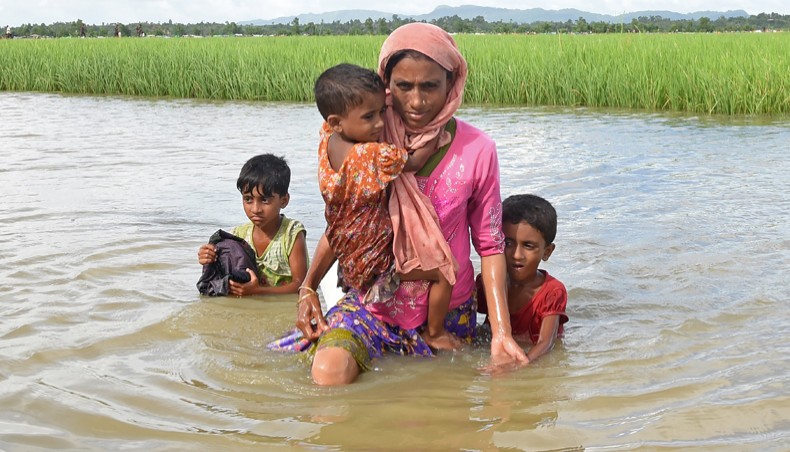No respite from Rohingya crisis in sight
The government believes that Rohingya crisis is unlikely to be resolved soon as the exodus of the forcibly displaced Myanmar nationals into Bangladesh continues amid unrelenting violence by security forces in Rakhine State.
The ethnic minority community continued to cross porous borders into Bangladesh through different points of forests and hilly terrain, canals and the River Naf amid rain on Wednesday, Cox’s Bazar district administration officials said.
Bangladesh authorities were also planning to allow about 15,000 Rohingyas stranded near the border at Anjuman Para border crossing point at Ukhia to cross the border.
‘Exodus of Rohingyas continued as violence in Rakhine was not stopped,’ foreign minister AH Mahmood Ali said on Wednesday, adding, ‘crises with this magnitude cannot be resolved in a day. It would not be resolved even in a month.’
At a press conference at the ministry, he said that ‘there is no sign of end of violence’ although all major countries and the international community urged Myanmar authorities to stop violence.
European Union ambassador in Dhaka Rensje Teerink on Wednesday said she did not see any goodwill from Myanmar to come forward in resolving the crisis with the implementation of the final report of the Kofi Annan Commission and effectively engaging with Bangladesh.
The European Union imposed targeted restrictions on defence cooperation with Myanmar including arms export and extending invitations to top leadership of the Myanmar security forces.
Rohingya new arrivals, mostly women, children
and aged, continued struggling to put up makeshift shelters on hill slops and in forests, collect reliefs and manage health services amid efforts of the government and local and international quarters to provide them with emergency services.
‘All efforts are on to provide them with whatever they need,’ Cox’s Bazar deputy commissioner Md Ali Hossain told New Age on Wednesday.
Asked about Rohingyas stranded along the borders, he said that they would be allowed in phases after the selection of a place for their shelter.
They were, somehow, provided with urgent relief materials including food and drinking water in alternative arrangements, relief workers said.
‘We cannot cross the international border,’ Hossain said.
As of October 17, some 5,82,000 Rohingyas entered Bangladesh in the new influx starting from August 25 what the United Nations called the world’s fastest-developing refugee emergency, according to UN estimation.
Officials estimated that the new influx already took to 10 lakh the number of Myanmar nationals living in Bangladesh, entering the country in phases since 1978.
The new influx began after Myanmar security forces responded to Arakan Rohingya Salvation Army’s reported attacks on August 25 by launching violence what the United Nations denounced as systematic ethnic cleansing and crimes against humanity.
The United States, the United Kingdom and France have taken a move to assess the possibility of passing a resolution involving China and Russia on Rohingya issues in the UN Security Council, diplomats said.
Amnesty International on Wednesday said that different units of the Myanmar security forces continued targeted campaign of widespread and systematic murder, rape and arson constituting crimes against humanity.
Dozens of witnesses to the worst violence consistently implicated specific units, including the Myanmar Army’s Western Command, the 33rd Light Infantry Division, and the Border Guard Police, according to an Amnesty International release.
The Rome Statute of the International Criminal Court lists 11 acts which, when knowingly committed during such an attack, constitute crimes against humanity.
Amnesty International has consistently documented at least six of these amid the current wave of violence in northern Rakhine: murder, deportation and forcible displacement, torture, rape and other sexual violence, persecution, and other inhumane acts such as denying food and other life-saving provisions.
‘Given their ongoing denials, Myanmar authorities may have thought they would literally get away with murder on a massive scale,’ Tirana Hassan, crisis response director at Amnesty International, said, adding, ‘but modern technology coupled with rigorous human rights research have tipped the scales against them.’
The global parliamentary community on Wednesday condemned the ethnic cleansing of the Rohingya minority and urged Myanmar to stop blatant violations of their human rights.
In a resolution adopted at the 137th Assembly of the Inter-Parliamentary Union, the global parliamentary community urged Myanmar to take concrete steps to put an end to the ethnic cleansing of the Rohingyas from Rakhine state, and to end further human rights violations.
IPU president Saber Hossain Chowdhury said that this crisis was a major threat to regional peace and security.
Bangladesh-origin British lawmaker Tulip Siddiq urged the government of the United Kingdom engage more in its efforts to end violence in Rakhine. ‘We must do more to fight this horror,’ Tulip said in the British Parliament, according to a tweet she posted on Twitter.
News Courtesy: www.newagebd.net











